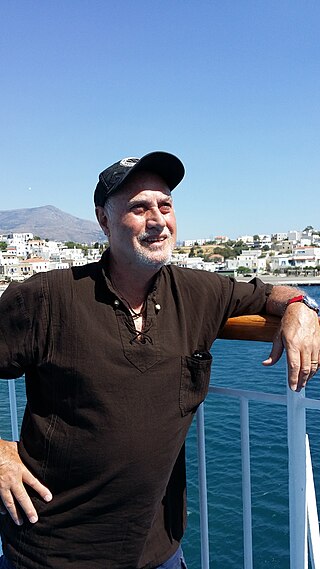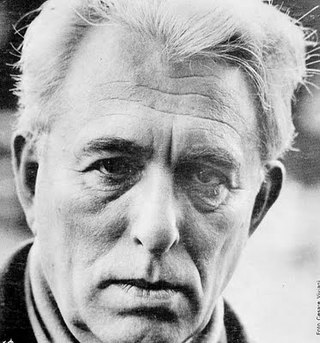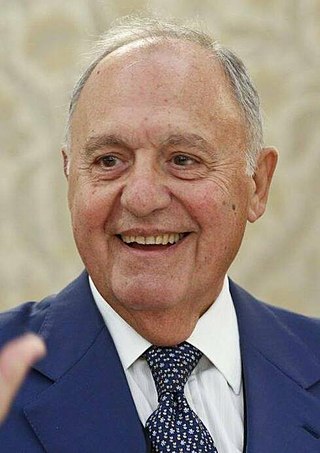Life
Born into a middle class Jewish family, Paolo Alatri had his secondary education at the Torquato Tasso in Rome, where his classmates included Bruno Zevi and Mario Alicata. After graduating with a degree in literature and philosophy from the University of Rome in 1940 [1] he enrolled in the Action Party, taking an active part in the defense of Rome (September 1943) and subsequently in the Italian resistance movement. [2] After the war he became a Communist (1943) and was elected to the Chamber of Deputies on the PCI list. He alternated his political activities with teaching history, first at the University of Palermo, then at the University of Messina and finally at the University of Perugia, where he was in charge of the Dipartimento di Scienze Storiche for a period in the 1980s.
An upstanding man with deep democratic beliefs, he educated generations of students in the code of honour propagated by the Resistance in the 1940s: love of liberty, respect for human dignity, solidarity with the poor and the oppressed. A strong supporter of the USSR, he was also President of the Associazione Italia-URSS (1961-1970) and later a member of its governing board. He resigned from the board in 1980 as a result of the Moscow authorities' treatment of the nuclear physicist Andrei Sakharov, saying "Non posso essere amico di chi si comporta come al tempo degli Zar" (I cannot be a friend of those who behave as in the time of the Tsar). [3] He died at Rome in 1995 from an incurable disease.
Historian and journalist
Paolo Alatri was especially interested in Modern and Contemporary European History, with particular interest in the Eighteenth century reformists, Italian unification (which he taught at the University of Palermo) and the rise and fall of Fascism. His literary and historical studies on the life and works of Gabriele D'Annunzio are of fundamental importance, as are his philosophical studies of the leaders of the Enlightenment and of some contemporary Italian thinkers. [4] Among the last category is a valuable biography of Bertrando Spaventa, published at Rome in 1941 [5] (his first work) and particularly appreciated by Benedetto Croce, who invited the author (then only twenty-three years old) to Naples so that he could meet him.
Paolo Alatri was strongly dedicated to journalism. He wrote for l'Unità , Corriere della Sera and other important newspapers. He was editor in chief of Ulisse journal and a collaborator in Rinascita and Studi Storici.
Enzo Sellerio was an Italian photographer, publisher, and collector.
Alberto Oliverio is a biologist and psycho-biologist. He is currently professor of Psychobiology at the Sapienza University of Rome. He has been one of the main assistants of Nobel prize winner Daniel Bovet.
Giorgio Bàrberi Squarotti was an Italian academic, literary critic and poet. He taught at the University of Turin from 1967 until his death in 2017. He was considered to be one of the most important literary critics of his time.

Arnoldo Foà was an Italian actor, voice actor, theatre director, singer and writer. He appeared in more than 130 films between 1938 and 2014.

Alessandro Barbero is an Italian historian, novelist and essayist.

Luigi Augusto Fontanella is an Italian poet, critic, translator, playwright, and novelist.

The Perfect Fusion was the 1847 act of the Savoyard King Charles Albert of Sardinia which abolished the administrative differences between the mainland states and the island of Sardinia within the Kingdom of Sardinia, in a fashion similar to the Nueva Planta decrees between the Crown of Castile and the realms of the Crown of Aragon between 1707 and 1716 and the Acts of Union between Great Britain and Ireland in 1800.

Mario Tronti was an Italian philosopher and politician, considered one of the founders of the theory of operaismo in the 1960s.

Franco Fortini was the pseudonym of Franco Lattes, an Italian poet, writer, translator, essayist, literary critic and Marxist intellectual.
Corrente di Vita was a biweekly Italian culture magazine published between 1938 and 1940.
Giuseppe Scaraffia is an Italian writer and professor.

Paolo Savona is an Italian economist, professor, and politician. He was the Italian Minister of European Affairs from 1 June 2018 until 8 March 2019, his second stint in government after 1993–1994. During the 2010s, Savona became one of the most fervent Eurosceptic economists in Italy.

Ruggero Grieco was an Italian politician, antifascist, and member of the Italian Communist Party. He was born in Foggia, Apulia.

Marco Malvaldi is an Italian crime writer.
Marcello Landi (1916–1993) was an Italian painter and poet.

Enzo Carnebianca, is a sculptor and painter born in Rome Italy.

Laura Conti was an Italian anti-fascist partisan, doctor, environmentalist, socialist politician, feminist, and novelist, considered one of the avant-garde figures of Italian environmentalism.
Salvatore Lupo is an Italian historian and author from Siena, specializing in the Sicilian Mafia.
Carmelo Samonà was an Italian academic and writer, as well one of the most important Italian Hispanists.
Paolo Spriano was an Italian historian of the Italian labor and communist movement.
This page is based on this
Wikipedia article Text is available under the
CC BY-SA 4.0 license; additional terms may apply.
Images, videos and audio are available under their respective licenses.











